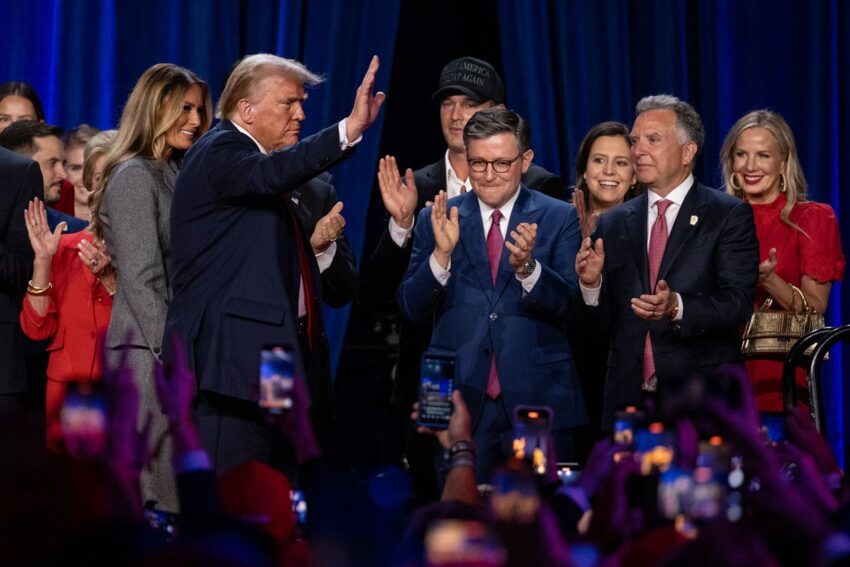Democrats’ recriminations started immediately, but Trump’s victory was decisive enough that there may have been little Kamala Harris could have done.
WEST PALM BEACH, Fla. — Democrats were counting on fed-up women to elect America’s first female president. Instead, dissatisfied men helped return Donald Trump to power.
The president-elect’s two eldest sons helped him pick a running mate who once decried “childless cat ladies,” while his youngest son, Barron, encouraged his father’s pivot to podcasts in an effort to reach other young men, a typically reliably Democratic voting bloc that split evenly this year.
“I think the gender gap is going to be the story of the next 20 years. Truly,” Democratic strategist Caitlin Legacki said. “There are a lot of men who feel like they’re being left behind, that society doesn’t have a place for them. And if we don’t want a civil war breaking out along gender lines, we’ve got to figure that out. That is the biggest widening gap in American society.”
The entire country shifted right, like other Western democracies in the inflationary post-Covid era. And with the electorate in a foul mood, Vice President Kamala Harris struggled to separate herself from a deeply unpopular incumbent who waited too long to step aside and whose aides had undermined her for years.
Trump, meanwhile, made strides in his promise to assemble a multiracial working-class coalition, winning 45% of Latinos and 55% of Latino men — records for a Republican presidential candidate — while making gains in blue states and pushing his margins among non-college-educated and middle-income voters to new heights, according to NBC News exit polls.
“The demographic shifts for us were just so brutal,” a Harris aide said. “Our people rejected us.”
Democrats’ recriminations started before the clock ran out on Election Day — Harris was too cautious, many said, or she should have broken cleanly from President Joe Biden and replaced the leaders he installed in the campaign — but Trump’s victory was conclusive enough across the board that there may have been little she could do.
“The electorate has moved decisively to the right on a number of key issues, which happen to be the key issues that defined this election, especially immigration and inflation,” said Evan Roth Smith, the lead pollster for the Democratic group Blueprint. “It was probably impossible for any Democrat to win, and probably any Republican could have won, because Harris made probably the best possible attempt to win it and Trump made the best possible attempt to lose it.”
t.”
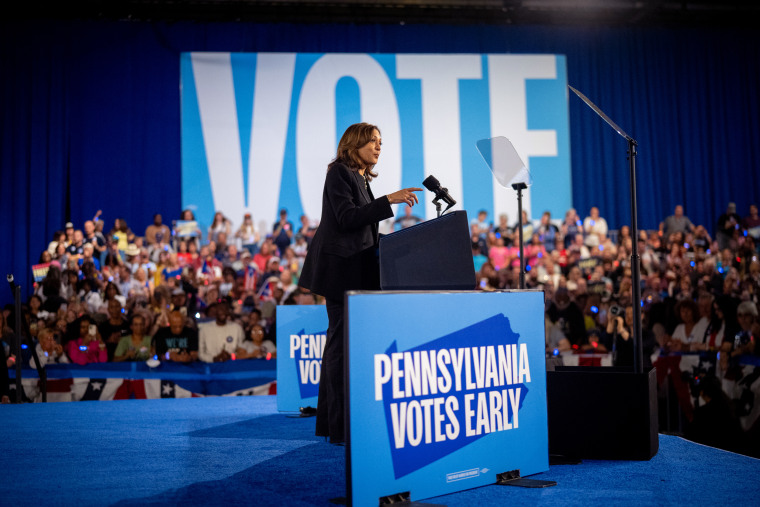
Indeed, on his third run for the presidency and after nine years as a fixture of American life, Trump is positioned to be the first nonincumbent Republican of the century to win not just the Electoral College, but also the most votes.
“The worst part: He’s going to win the popular vote, too,” another Harris aide said.
This account of how Trump won and how Harris lost is based on more than 35 interviews with operatives and officials from both parties and campaigns, many of whom were granted anonymity to offer immediate candid observations about what went right or wrong.
New campaign, same Trump
Less than four years ago, after the Jan. 6 riot at the U.S. Capitol, Trump was cast into the political wilderness by his own party, as Republicans turned to new faces they thought could harness Trump’s energy but with less of his baggage, like Florida Gov. Ron DeSantis.
Republican voters had other ideas, sticking with Trump, the former reality TV star, who reclaimed his image as an outside change agent and faced prosecutions and two assassination attempts.
A campaign official said Trump’s primary clash with DeSantis helped him hit his stride after a “social stigma” followed him in the early months of his post-presidency.
“Rewind back to 2021 and 2022 —it was kind of rough,” a campaign official said. “He wasn’t seen as cool. The spark was gone a little bit. When he really started with DeSantis, the spark came back to him. Having an adversary brought the spark back.”
The “social stigma” receded further after the indictments, this person said.
“It turned Donald Trump into a f—ing folk hero and icon,” the person added.
“And then he gets shot, and that only increases the view of him as a folk hero and icon.”
Breaking from the improvisational chaos that defined his 2016 and 2020 campaigns, Trump “made it clear from the beginning: He wanted a professional operation,” said Chris LaCivita, who along with fellow senior adviser Susie Wiles co-managed a campaign that was widely seen as more disciplined and competent than his previous ones — even if Trump himself remained as allergic to staying on message as ever.
Outside of some clashes involving LaCivita and longtime Trump adviser Corey Lewandowski that recently spilled out into public, there was little of the backstabbing that typified past Trump campaigns.
“There was very little drama,” a campaign official said. “It was like a normal campaign where people basically got along. You would talk through strategy, agree on stuff and you wouldn’t run to NBC to knife the person if you disagreed with them.”
Sponsored Stories
ONLINE SHOPPING TOOLSSeniors Can Now Fly Business Class For the Price Of Economy
COUPON CODE FINDERAmazon’s Worst Nightmare: Thousands Canceling Prime for This Clever Hack
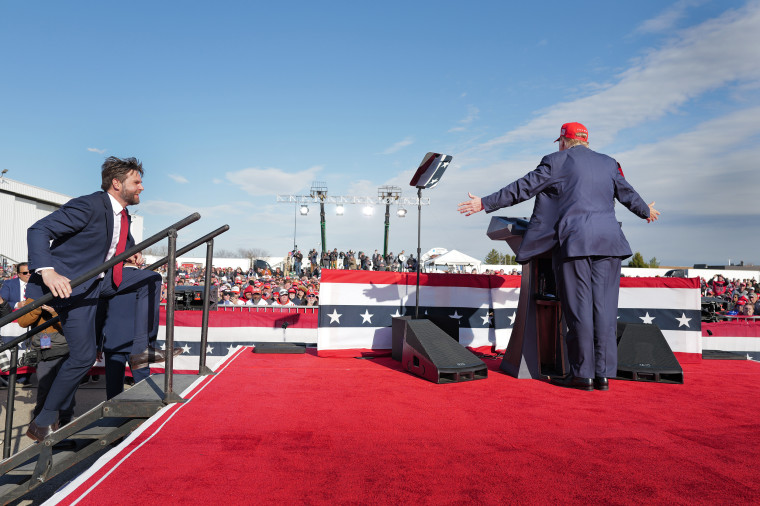
With young male voters in mind, 18-year-old Barron Trump, who voted for the first time Tuesday, worked with campaign adviser Alex Bruesewitz to prioritize influential male podcasters with large followings, two sources familiar with the strategy said. The elder Trump popped up on programs like Barstool Sports’ “Bussin’ With The Boys,” as well as shows hosted by comedians Andrew Schulz and Theo Von and Mark Calaway, better known to fans of professional wrestling as the Undertaker.
Their big coup was Joe Rogan, who reaches more than 17 million YouTube subscribers. In the final weeks of the campaign, Trump kept supporters at a Michigan rally waiting for hours after he detoured to Texas to record Rogan’s show.
Harris was invited on the show, too, and her campaign seriously considered it. Senior leaders pushed for it, but they ultimately concluded the risk was not worth it since they were not going to win Rogan’s audience — and Rogan himself endorsed Trump on the eve of Election Day. The Harris team’s handling of the invitation, though, highlighted the campaign’s and Harris’ own cautious approach to public appearances, which Democrats now say was a mistake.
“We have to go on Joe Rogan. I’d counter that progressives need to create and support their own Joe Rogan,” said Rep. Ro Khanna, D-Calif.
In the immediate weeks after Harris replaced Biden atop the ticket, a precious moment when Americans were still formulating their opinions of her, she did no interviews or media appearances, which many felt was a mistake because data showed voters responded well to her and moved more and more in her direction the more they saw of her.
For instance, Future Forward, the flagship pro-Harris super PAC known for its rigorous testing of ads before they air, showed voters more than 750 video clips and found that the most compelling ones often featured Harris in her own voice.
“At the start of her campaign, people knew of her, but they didn’t know her. They knew the name, but they didn’t know the person,” said Jesse Ferguson, a Democratic strategist who was a consultant for Future Forward.
As they surveyed the wreckage Wednesday, campaign chair Jen O’Malley Dillon came in for particular criticism — inevitable for the leader of any losing campaign — with accusations that she exerted too tight control or sidelined people close to Harris.
A layer of high-priced former Barack Obama aides like David Plouffe and Stephanie Cutter was brought in to help manage the final stages of the race and tasked to “fix” projects that some felt did not need fixing, breeding resentment and distrust under the surface of two teams that were forced together in trying circumstances.
Others criticized the campaign’s decision to go all in on courting anti-Trump Republicans and elevate billionaire Mark Cuban, even as her TV ads criticized billionaires like Trump.
“You spent hours with Liz Cheney and guess what? We find out Liz Cheney was inconsequential,” said a Democratic strategist who is a Harris ally.
‘Getting gaslit’
That Joe Biden’s June debate performance was a disaster was immediately evident to everyone — except for Biden and the cadre of loyalists surrounding him.
“I texted a friend 10 minutes into the debate saying, ‘He’s got to drop or we’re going to lose,” said Ezra Levin, a co-founder of Indivisible, the progressive grassroots movement that popped up after Trump’s first election.
Biden’s age was hardly a secret — former special counsel Robert Hur had called him an “elderly man with a poor memory” in an official report in March — and many Democrats had privately hoped Biden would not run for re-election, though few were willing to say it publicly.
But Biden allies indignantly insisted, even to their own staff members, that everything was fine while privately telling donors and party officials that Biden had to stay in the race because Harris was not up to the task.
“Staff felt like they were getting gaslit,” said a Democrat involved in the re-election effort. “There was this determination among some people in the Biden campaign, DNC and White House that under no circumstances would Biden leave the race, even though all of the data was showing he had no path to win. That was probably the most troubling thing.”
Multiple Harris aides believed that Biden allies had undermined Harris in private from the beginning of the administration, afraid she would outshine him. They told Biden to stay in the race even as his support collapsed. And then many of them suddenly found themselves running Harris’ campaign.
“The very people who ensured that she had low approval ratings were then the same people who had to try, in these last three months, to increase her approval ratings and to get people to like her,” a Harris ally said.
It took nearly a month after the debate for Biden to step aside, costing Harris critical time and giving what was now her campaign just 100 days to build a campaign, put on a convention, pick a running mate, prepare for the debate and formulate a messaging strategy.
She inherited a relatively sleepy campaign, with limited infrastructure in the battleground states and difficulty attracting top talent to what to many feared was a doomed ship.
“Nobody wanted to work for him,” a campaign official said. “It was dying.”
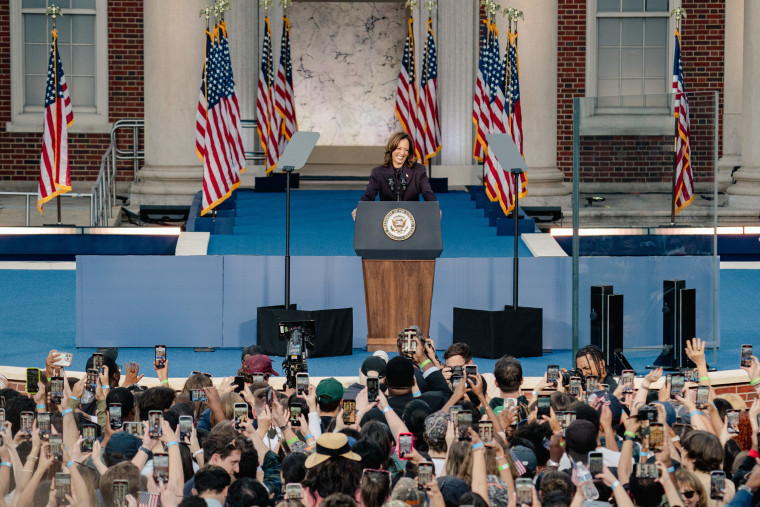
Biden retained the presidency, though he could have handed it to her, making it impossible for Harris to fully break with someone to whom she felt intensely loyal for having picked her as his running mate.
After he abdicated, the White House was diminished. While the rest of the party thrilled, the mood was more somber at 1600 Pennsylvania Ave. The lame duck president now had to clear things with his deputy. “Have we run this by the vice president?” he would double-check with aides, according to a senior official.
Upon her departure, a senior White House aide offered this advice to a young White House staffer: “Revenge is a dish best served cold.”
What is widely viewed as Harris’ biggest gaffe in otherwise nearly flawless presentation came on “The View” when she struggled to say what she would do differently from Biden. At their rallies, Trump and his running mate, Sen. JD Vance of Ohio, relentlessly mocked Harris’ response.
“She makes that mistake on ‘The View’ because they told her ‘be loyal,’” said a person close to the campaign.
Another person in the Harris campaign said, “This is all on Joe Biden.”
Another aide, asked what happened, responded with two words: “Joe Biden.”
Biden allies note, however, how unusual it is for any political leader to voluntarily give up power, and they say his decision to run for re-election was sound given Democrats’ better-than-expected performance in the 2022 midterms.
“This has been an historic partnership in which these teams have worked together extraordinarily well,” said a White House official who has been there from the beginning.
RFK, McDonalds and ‘brat summer’
Despite — or perhaps because of — the lengthy delay, Harris entered the race with an enormous jolt of enthusiasm that put Trump on the back foot as Democrats reveled in “brat summer,” riding one big moment to the next.
Trump seemed completely flummoxed about how to run against the younger, telegenic woman, opening with a bizarre attack accusing her of only recently having become Black.
“What was shocking to me,” said a person close to Trump who had direct knowledge of campaign operations, “is that his team was exceptionally slow to [Harris] getting in the race.”
It took an endorsement from Robert F. Kennedy Jr. to jolt Trump out of his summer slump. The addition of former Democratic presidential candidate Tulsi Gabbard and figures outside of politics like billionaire Elon Musk helped Trump reclaim the image of a change agent not beholden to the unpopular two-party duopoly.
“Not enough people understand the importance of that,” a Trump campaign official said of the Kennedy nod. “Not saying he’s determinative, but I do think his endorsement means a lot more than the media gives him credit for. It was the first energizing move that the campaign had since the switch-out.”
A Democrat close to the Harris campaign said: “Brat summer had to end. The music felt like it stopped playing a bit in the beginning of October.”
Once Harris got through the Sept. 10 debate, the campaign was unsure how to proceed, with two months to go and no tentpole moments to build off of.
The postdebate period was “nerve-racking” because the campaign was looking ahead asking, “What do we do with that six-week period?” an aide said.
Running against Trump, who was convicted of felonies during the campaign, presented some unusual challenges.
Biden’s team initially thought Trump’s conviction would be a political win. In an all-staff call after his conviction, according to a Biden campaign official, there was a sense that there was a turning point in the race. Word went out during that meeting to add a line on Trump’s being a “convicted felon” to their talking points.
By the time Harris took over, that logic was less certain to campaign leaders. They worried that branding Trump a felon could sound discordant to Black men, about one-third of whom have felony records, and to potentially persuadable voters. Surveys found many registered independent voters suspected Trump’s prosecutions were politically motivated.
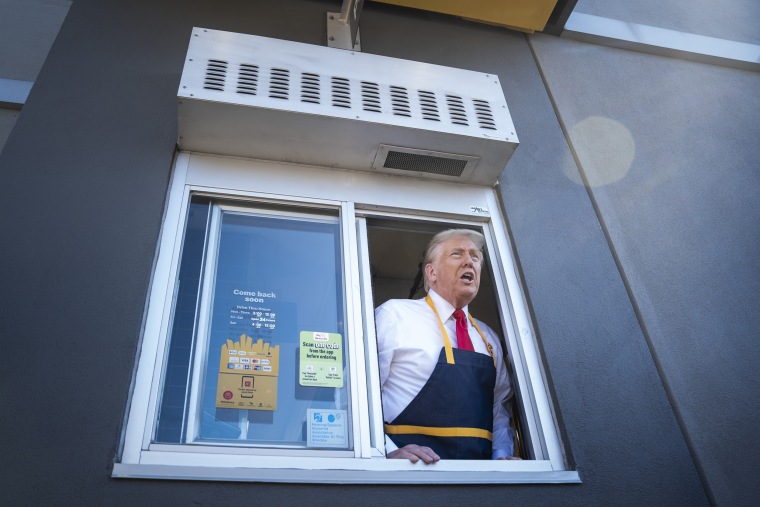
Harris’ brief stint working at McDonald’s as a college student took on a bigger life than her campaign expected, and after Trump made a splash by “working” a McDonald’s drive-thru, her team scrambled to reclaim the iconic fast-food brand.
Her team schemed up a proposal for a McDonald’s ambassador to ceremonially award Harris a special token for McDonald’s alumni, but an E. coli outbreak at the chain led her campaign to hesitate and pull back on the idea, which never came to fruition, according to a campaign official.
The campaign finally felt like it was getting its mojo back when a comedian at a Trump rally at Madison Square Garden in New York City made jokes about Puerto Rico’s being a floating island of garbage — but the good vibes were immediately curbed by Biden’s own trash gaffe about Trump supporters.
A campaign official said staff members were in the motorcade leaving Harris’ big closing-argument speech at the Ellipse in Washington, D.C., when their phones started pinging with people sharing Biden’s comments.
“Staff was crestfallen, even the true-blue [Biden] loyalists,” the campaign official said, though the moment did not take on the infamy of Hillary Clinton’s “deplorables” moment that many had feared.
Vance got past the early turbulence that the resurfacing of his 2021 remarks about “childless cat ladies” had caused. But in September, as Trump prepared to debate Harris for the first and only time, Vance’s penchant for hot takes and social media trolling struck again. Posting about an influx of Haitian immigrants in Springfield, Ohio, Vance spread an unsubstantiated rumor that the Haitians were abducting pets and eating them. Trump repeated the baseless claim at the debate the next night, setting the tone for a widely panned performance against Harris.
Internally, there were Trump aides who nonetheless saw the Springfield discourse as a positive — “simply the lightning rod to get the media talking about immigration,” an issue that played to the GOP’s strengths — a Trump campaign official said.
“It did force them to address that issue, and, at the very least, I don’t think it hurt and it probably helped,” the official added.
At least one Democratic strategist agreed with that assessment, making sure not to be quoted about it.
The election
Trump will return to the White House with a bigger mandate than he had in 2016 and a friendlier Senate after Republicans won most of this year’s contested races. The House remains too close to call.
And, unlike in 2016, no one can claim America did not understand what it was voting for.
“We won because the American people got to see the REAL Donald Trump!” Bruesewitz, the 27-year-old campaign adviser who worked with Barron Trump on the podcast strategy, texted as Trump delivered his victory speech. “He is a once in a lifetime leader and he completely embodies the spirit that makes this nation great.”
By Alex Seitz-Wald, Henry J. Gomez and Natasha Korecki
SOURCE: ABC News
Want more articles like this? SUBSCRIBE NOW!


